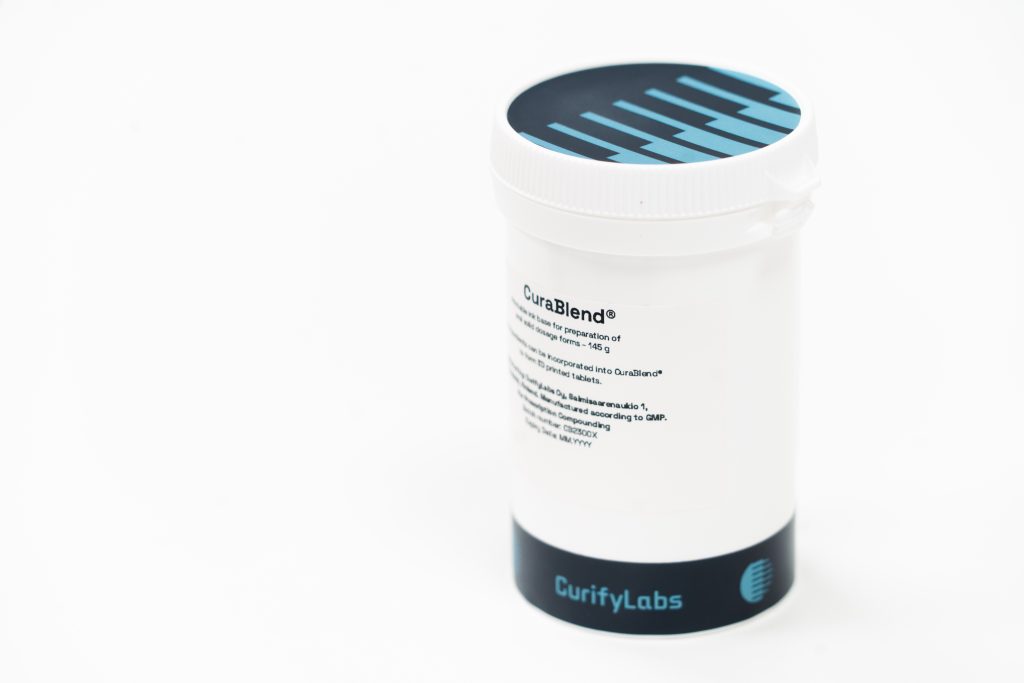Pharmaceutical customization technology developer CurifyLabs has launched Good Manufacturing Practice (GMP) developed Pharma Inks for on-site production of patient-tailored and personalized medicines in pharmacies and hospitals.
Unlike the traditional manual compounding process, which can be time-consuming and prone to human errors, CurifyLabs’ technology automates the production of customized medications. Pharmacists have access to a library of printable inks and a 3D printer, ensuring fast and compliant drug manufacturing.
“With our 3D printing solutions, we aim to reshape the landscape of patient-tailored medicines in hospital and compounding pharmacies. Our goal is to build foundations for a healthcare system that delivers not only customized medications but also greater convenience, enhanced patient safety, and time savings for pharmacists,” says Charlotta Topelius, CEO and Co-Founder of CurifyLabs.

CurifyLabs’ 3D printing technology streamlines pharmaceutical compounding
According to the company, the pharmaceutical industry is increasingly recognizing the importance of personalized medicine, as genetic differences, age, gender, allergies, and disabilities can all influence how patients respond to medications. Standardized dosages may not be suitable for everyone and can lead to ineffective treatments and adverse reactions. Personalized treatment is especially crucial for patients such as those with cancer and children.
Niklas Sandler, CTO and Co-founder of CurifyLabs explains that by collaborating with CurifyLabs, pharmaceutical professionals are enthusiastic about the potential of this technology. Pharmaceutical 3D printing not only streamlines the compounding process but also saves time, with up to a 70% reduction compared to manual methods. This advancement is set to reshape the landscape of patient-tailored medicines in healthcare, enhancing convenience, patient safety, and efficiency for pharmacists.
“Pharmacy-tailored drug manufacturing is very laborious and involves manual work steps. We have been waiting for this type of technology,” says Catharina Kern, Pharmacist, at Münster University Hospital.
As per Global Market Insights, the global compounding market, which was valued at $11 billion in 2022, is projected to reach $18.2 billion by 2030, driven by the increasing demand for personalized medication. CurifyLabs aims to contribute to this growing market by delivering customized medications and improving patient care. Its technology opens doors to a healthcare system that prioritizes individualized treatment and ensures a brighter future for healthcare, says the company.
Last year, CurifyLabs and food printing firm Natural Machines collaborated on a low-cost drug 3D printer that streamlines personalized medicine production for pharmacies and hospitals. This “pharma-compliant” system aims to offer efficient, automated drug customization, promising faster production. The 3D printer was expected to launch in 2022 to enhance pharmaceutical compounding.
Manufacturing on Demand

3D printed personalized medicines: the future of healthcare
Pharmaceutical start-up MB-Therapeutics is using its MED-U Modular 3D printer to provide personalized on-demand treatment to patients. Collaborating with healthcare institutions like the University Hospital Center of Nîmes, the company creates tailored medication production solutions for children. This 3D printing technology enhances patient and family quality of life by preventing dosing errors. It also helps address supply shortages and automates high-quality medication production, significantly reducing the substantial 15,000-ton medication waste in France, making a substantial contribution to healthcare.
Researchers from the Max Planck Institute for Informatics and the University of California Davis developed a 3D printing process to create pills for personalized medicine. By printing pills in specific shapes, they could control the rate of drug release in the body. This method offered advantages in terms of drug delivery control compared to other methods. The research had the potential to impact the pharmaceutical industry and had applications beyond medicine, including catalytic bodies and fertilizers. The researchers believe that 3D printing would play a major role in advancing personalized medicine.
You might also like:
3D Systems’ 3D printed cranial implant paves the way for personalized patient care: 3D printer manufacturer 3D Systems has used its point-of-care technologies to create a patient-specific 3D printed cranial implant for a procedure at the University Hospital Basel in Switzerland.
* This article is reprinted from 3D Printing Industry. If you are involved in infringement, please contact us to delete it.
Author: Ada Shaikhnag

Leave A Comment